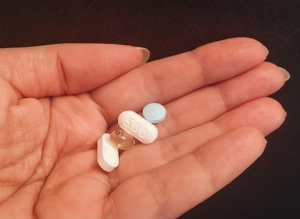Diabetes: Discrimination, Professional Life, Plan Ahead... What do patients say?
Published 9 Nov 2018 • Updated 4 Dec 2020 • By Louise Bollecker

What are the issues concerning Diabetes that should be addressed by governments and organisations? What do you want those without diabetes to understand? What should be changed in the United Kingdom?
For World Diabetes Day this November 14th, we are highlighting some of our members responses.
Here are the solutions they propose and the findings that shock them.

An invisible condition from the outside
As with many conditions that are not seen from the outside, it is sometimes difficult to be understood and recognised as ill when you have diabetes. One of our members, @hackie5 agrees with this lack of recognition concerning her disease," I have a lovely family but still feel they don't understand how much I'm affected by my illness". It seems clear that we need to talk more about diabetes and make others aware of it
For @elizabethmary , who has recently been diagnosed with diabetes type 2 last year, she has felt "I'm shocked and scared and a little depressed" because diabetes requires a complete lifestyle change and a hyper awareness of what you are eating and drinking.
Both @richard0804 and @stillme say however it gets easier to deal with as time goes on and you become accustomed to the changes in lifestyle and how to manage, stating that your "doctor is a great help" and that "you get used to altering your fast acting insulin"
Workplace discrimination
There has been documented instances of employment discrimination of those diagnosed with diabetes. Many of our members have displayed a reluctance or hesitation to share their diabetes with their employes and coworkers @sophHaj was concerned when starting in her new job, "Should I tell my colleagues and my boss? Would it make them look at me differenty? And treat me differently?"
If you fear you are being discriminated against or know someone who is because of their diabetes, learn more about employment discrimination and your rights.
The need to be prepared and plan ahead
One of our members considers her diabetes to be " like having another full time job. You always have to be aware of what to eat and when."
The difficulties continue when eating out in restaurants because you lose control over what is put into the food and how it is cooked. @asranda shares her tips for eating out, "What I do is just keep count of everyhting and ask all the ingredients everytime, I know it is a bit unconvenient sometimes, but I think I am now used to it"
Read more about what other members say living with diabetes is like, comment, and share: What it is like living with Type 2 Diabetes | What it is like living with Type 1 Diabetes
A better relationship between doctors and patients
For @stephenmcd, they felt one of the most intimidating aspect of their diagnosis was "being give an insulin pen for the first time to self-inject" and knowing they would have to do this forever. One of our members wishes the medical staff would be more understanding/supportive: she fears "going in for [her] next a1c test..the last one was 6.9 and [her] doctor at that time stressed [her] out."
For @Totor644, it is necessary to "improve the quality and duration of the exchange periods between patients and doctors: more time for consultations (30 minutes and not 10) and for the annual check-up..."
It also seems to be a consistent concern among patients that they do not feel that have a good understanding of the disease and the monitoring of numbers that go along with it.
Here are some discussions between members discussing the numbers and monitoring: Blue Glucose Monitor
Medical devices and equipment that could be improved
For its part, @Yvelise is interested in the improvements that its medical devices could undergo: "I appreciate every day my mini POD insulin pump from... But couldn't we plan a change of OmniPod, operate it without batteries and recharge it like all devices connected with a cable? This would allow it to be built smaller and less heavy to transport."
New discussion created dedicated to recommendations and improvements in equipment you would like to see: Type 2 Discussion | Type 1 Discussion
Concerns with having kids
For @leighbee38, she already has a child with diabetes and she worries about what he is eating throughout the day to maintain his I:C ratio.
@Kaygee diagnosed with type 1 at age 4 who is hoping to have children, has fears magnified with the idea of "being diabetic and pregnant. This was further magnified by her husband's mother who said "diabetics have a hard time having babies..."
Testimonials
Read some of our members inspiring stories and tips about dealing with diabetes, such as Stephen's guidance on living normally with type one or these helpful nutrition tips from Elisa.
So, will you join the conversation?
What shocks you about diabetes management? What needs to be improved?
Carenity
13 comments


 Facebook
Facebook Twitter
Twitter





